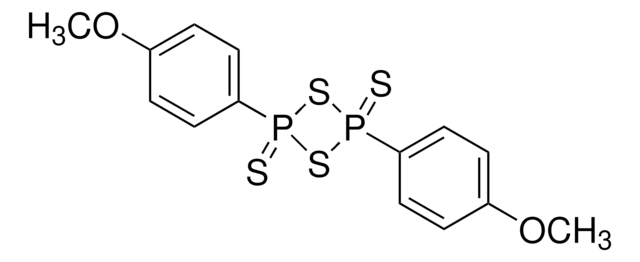634239
Chromium(III) oxide
nanopowder, <100 nm particle size (TEM), 98% trace metals basis
Synonym(s):
Chromia
Sign Into View Organizational & Contract Pricing
All Photos(3)
About This Item
Empirical Formula (Hill Notation):
Cr2O3
CAS Number:
Molecular Weight:
151.99
EC Number:
MDL number:
UNSPSC Code:
12352302
PubChem Substance ID:
NACRES:
NA.23
Recommended Products
Quality Level
Assay
98% trace metals basis
form
nanopowder
particle size
<100 nm (TEM)
SMILES string
O=[Cr]O[Cr]=O
InChI
1S/2Cr.3O
InChI key
QDOXWKRWXJOMAK-UHFFFAOYSA-N
Looking for similar products? Visit Product Comparison Guide
Application
Used in a solid-state reaction to form the new ternary oxide, CrVMoO7, can be used in selective oxidation.
Storage Class Code
11 - Combustible Solids
WGK
nwg
Flash Point(F)
Not applicable
Flash Point(C)
Not applicable
Personal Protective Equipment
dust mask type N95 (US), Eyeshields, Gloves
Choose from one of the most recent versions:
Already Own This Product?
Find documentation for the products that you have recently purchased in the Document Library.
Customers Also Viewed
In vitro macrophage response to nanometer-size chromium oxide particles
VanOs R, et al.
Journal of Biomedical Materials Research. Part B, Applied Biomaterials, 102(1), 149-159 (2014)
S E Dutton et al.
Journal of physics. Condensed matter : an Institute of Physics journal, 23(24), 246005-246005 (2011-06-01)
α-SrCr(2)O(4) has a triangular planar lattice of d(3) Cr(3+) made from edge sharing CrO(6) octahedra; the plane shows a very small orthorhombic distortion from hexagonal symmetry. With a Weiss temperature of - 596 K and a three-dimensional magnetic ordering temperature
Nien-Hsun Li et al.
Journal of hazardous materials, 198, 356-361 (2011-11-15)
The feasibility of stabilizing nickel-laden sludge by a high-temperature NiCr(2)O(4) synthesis process was investigated with different sintering temperatures, salt contents, molar ratios, and reaction atmospheres. The crystalline phases of species were investigated by using an X-ray diffraction, and the surface
Noriko Nishino et al.
Physical chemistry chemical physics : PCCP, 14(45), 15840-15848 (2012-10-24)
While many studies of heterogeneous chemistry on Cr(2)O(3) surfaces have focused on its catalytic activity, less is known about chemistry on this surface under atmospheric conditions. We report here studies of the thermal and photochemical reactions of NO(2) on Cr(2)O(3)
L F Wang et al.
Journal of animal science, 90 Suppl 4, 415-417 (2013-02-13)
The CP digestibility is traditionally measured by chemical analyses of CP and marker concentration in digesta and diets. Potentially, CP digestibility can also be predicted by marker concentrations and spectral analyses of digesta and diet. Spectroscopy is a rapid, nondestructive
Our team of scientists has experience in all areas of research including Life Science, Material Science, Chemical Synthesis, Chromatography, Analytical and many others.
Contact Technical Service











